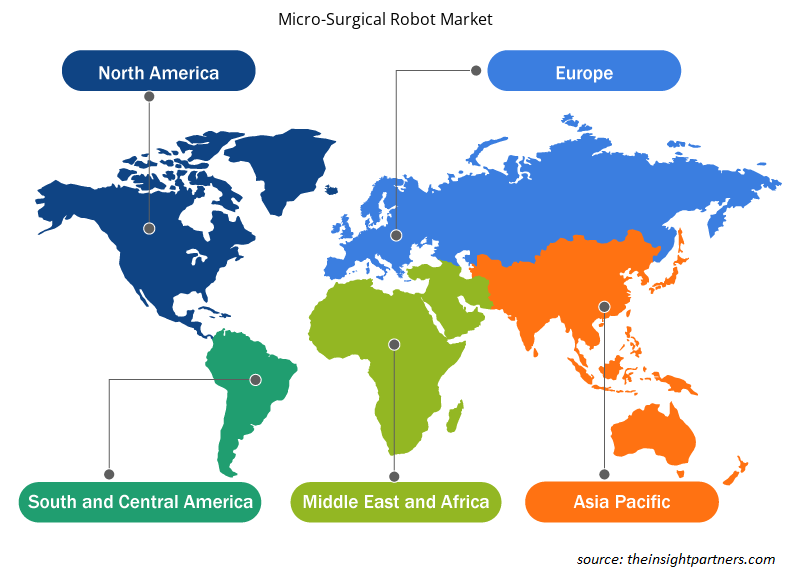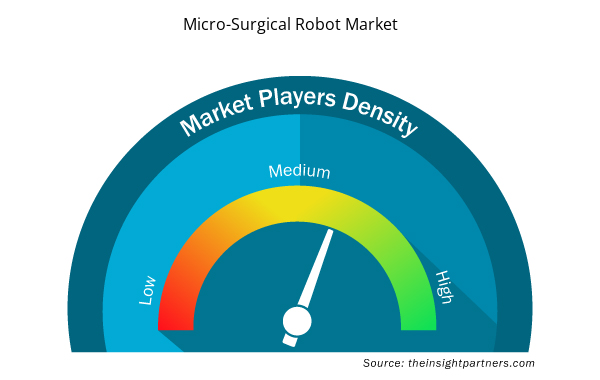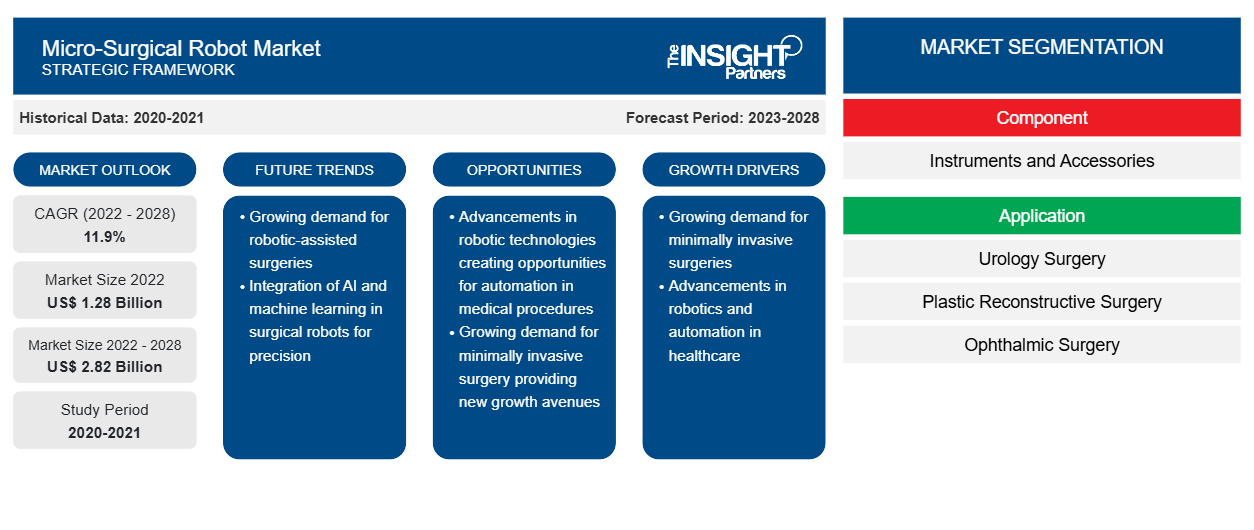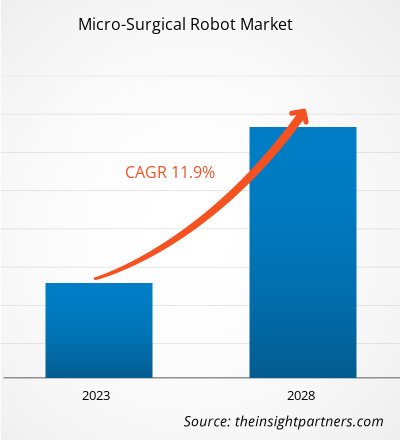Se espera que el mercado de robots microquirúrgicos crezca de US$ 1.280,81 millones en 2022 a US$ 2.817,57 millones en 2028; se espera que crezca con una CAGR del 11,9% de 2022 a 2028.
Los robots microquirúrgicos se utilizan para realizar microcirugías , es decir , procedimientos quirúrgicos intracorporales y extracorporales . Los robots pueden ayudar a realizar procedimientos quirúrgicos complejos de forma más flexible y precisa, lo que es posible con las técnicas convencionales. Los robots microquirúrgicos realizan procedimientos quirúrgicos mínimamente invasivos con incisiones diminutas. Las ventajas de los robots microquirúrgicos son menos complicaciones, pequeñas cicatrices, menor pérdida de sangre y una recuperación más rápida. La creciente popularidad de los procedimientos quirúrgicos mínimamente invasivos y las ventajas de las cirugías robóticas en términos de precisión, repetibilidad, control y eficiencia impulsan el crecimiento del mercado mundial de robots microquirúrgicos . Sin embargo, el alto costo de los robots microquirúrgicos y los escenarios de reembolso desfavorables en diferentes países están obstaculizando el crecimiento del mercado.
El informe ofrece información y un análisis profundo del mercado mundial de robots microquirúrgicos, haciendo hincapié en parámetros como las tendencias del mercado, los avances tecnológicos, la dinámica del mercado y el análisis del panorama competitivo centrado en los principales actores del mercado. También incluye el impacto de la pandemia de COVID-19 en el mercado en todas las regiones. Muchas autoridades sanitarias recomendaron evitar el contacto humano debido a la creciente transmisión y la presión sobre los recursos sanitarios posponiendo las cirugías electivas, suspendiendo las clínicas ambulatorias y clasificando a los empleados involucrados en la atención de urgencias. Las cirugías robóticas utilizan inteligencia artificial (IA), que se beneficia a través de tres aspectos: aumentar la precisión y reducir el riesgo de falla al brindar autonomía compartida y completa en tareas simples; permitir el distanciamiento físico al cambiar el rol del cirujano de ejecutivo a supervisor y de personal de control continuo a personal de control intermitente; y aumentar el número promedio de procedimientos quirúrgicos, que serán necesarios para abordar las cirugías atrasadas causadas por el cierre de las cirugías electivas durante un largo período. Por lo tanto, el mercado mundial de robots microquirúrgicos experimentó un impacto positivo después de la primera ola de COVID-19.
Personalice este informe según sus necesidades
Obtendrá personalización en cualquier informe, sin cargo, incluidas partes de este informe o análisis a nivel de país, paquete de datos de Excel, así como también grandes ofertas y descuentos para empresas emergentes y universidades.
- Obtenga las principales tendencias clave del mercado de este informe.Esta muestra GRATUITA incluirá análisis de datos, desde tendencias del mercado hasta estimaciones y pronósticos.
El mercado mundial de robots microquirúrgicos está segmentado en función de los componentes, la aplicación, el usuario final y la geografía. Por geografía, el mercado está ampliamente segmentado en América del Norte, Europa, Asia Pacífico, Oriente Medio y África, y América del Sur y Central.
Perspectivas de mercado
Ventajas de las cirugías robóticas en términos de precisión, repetibilidad, control y eficiencia
La introducción de la cirugía robótica es el avance más reciente en la liposucción. Un cirujano controla los tratamientos desde una consola maestra, mientras que el carro robótico para el paciente realiza los procedimientos con mayor facilidad y precisión que los sistemas laparoscópicos. Debido a su visión y precisión en 3D y a sus instrumentos intuitivos de múltiples rangos, la cirugía robótica tiene claras ventajas en los procedimientos de liposucción en comparación con las cirugías laparoscópicas tradicionales, lo que garantiza una mayor seguridad para el paciente. Las cirugías robóticas también ayudan a mejorar las habilidades de sutura y a reducir el dolor posoperatorio y el tiempo de recuperación. La liposucción asistida por robot también se recomienda para personas obesas que pesen más de 250 kg, ya que la liposucción laparoscópica es más exigente y difícil. Según un artículo - “Comparación de los resultados quirúrgicos entre la cirugía robótica integrada y la laparoscópica convencional para la gastrectomía distal : un análisis de emparejamiento por puntaje de propensión”, publicado en 2020, la tasa de éxito quirúrgico en el grupo de gastrectomía distal robótica integrada ( IRDG ) fue del 98%, significativamente mayor que la tasa de éxito en el grupo de gastrectomía distal laparoscópica convencional ( CLDG ), es decir , 89,5%. Aunque ambos grupos tuvieron tasas similares de problemas hospitalarios y ambulatorios, la tasa de readmisión del grupo IRDG fue mucho menor que la del grupo CLDG . Además, las cirugías robóticas ayudan a mejorar las capacidades de visualización, proporcionando a los cirujanos una mejor vista del área de trabajo y permitiéndoles ver detalles microscópicos utilizando cámaras de alta definición. Estos sistemas tienen más destreza que la mano humana, y su capacidad para rotar 360° y navegar mejor permite a los cirujanos llegar a áreas de difícil acceso. Un equipo de investigadores ha combinado un brazo propulsado por nitrógeno (como un quinto brazo robótico) con un sistema de lentes de video de aumento óptico (brazo Point-Setter y lente VITOM de Karl Storz , Tuttlingen , Alemania) para desarrollar una plataforma robótica para tratamientos microquirúrgicos robóticos extracorpóreos . El VITOM es un sistema de video exoscópico de alta definición con lentes ópticas que se utilizan para cirugía de columna y cirugía pediátrica. El aumento óptico en el sistema varía de 16× a 25×. El microcirujano puede ver la imagen desde el sistema VITOM justo debajo de la vista principal de la cámara 3D del robot utilizando el software de imágenes TilePro en la interfaz del cirujano. De esta manera, las microcirugías robóticas Garantizar una mayor precisión, repetibilidad, control y eficiencia. En línea con el creciente deseo de servicios de atención médica mejores y más rápidos, estos beneficios de los robots microquirúrgicos impulsan el crecimiento del mercado.
Información basada en componentes
Según los componentes, el mercado mundial de robots microquirúrgicos se divide en instrumentos y accesorios. En 2022, se espera que el segmento de instrumentos tenga una mayor participación de mercado. Se estima que el mercado de este segmento crecerá a una tasa compuesta anual más rápida durante el período de pronóstico.
Perspectivas basadas en aplicaciones
Según la aplicación, el mercado de robots microquirúrgicos se segmenta en cirugía plástica reconstructiva, cirugía otorrinolaringológica , cirugía urológica, neurocirugía , cirugía oftálmica, cirugía linfática y otras. En 2022, se estima que el segmento de cirugía urológica representará la mayor participación del mercado. Se espera que el mismo segmento registre la CAGR más alta entre 2022 y 2028.
Información basada en el usuario final
Según el usuario final, el mercado de robots microquirúrgicos se segmenta en hospitales y clínicas, centros quirúrgicos ambulatorios, institutos de investigación y otros. En 2022, se espera que el segmento de hospitales y clínicas tenga la mayor participación del mercado. Se espera que el mismo segmento registre la CAGR más alta entre 2022 y 2028. El crecimiento del mercado de robots microquirúrgicos para el segmento de hospitales y clínicas se atribuye al aumento en el número de procedimientos quirúrgicos y la adopción de equipos avanzados en estas instalaciones.
Los actores del mercado de robots microquirúrgicos adoptan estrategias orgánicas, como el lanzamiento y la expansión de productos, para ampliar su presencia global y su cartera de productos y satisfacer la creciente demanda. Por ejemplo, en mayo de 2022, MMI SpA anunció el lanzamiento de su simulador de sistema quirúrgico Symani, desarrollado por VirtaMed.
Perspectivas basadas en la geografía
Por geografía, el mercado mundial de robots microquirúrgicos está segmentado en América del Norte, Europa, Asia Pacífico (APAC), Oriente Medio y África (MEA) y América del Sur y Central. El mercado de América del Norte está segmentado a su vez en Estados Unidos, Canadá y México. El mercado de robots microquirúrgicos en Europa está subsegmentado en Francia, Alemania, Reino Unido, España, Italia y el resto de Europa. El mercado de robots microquirúrgicos de APAC está subsegmentado en China, India, Japón, Australia, Corea del Sur y el resto de APAC. El mercado de MEA está segmentado a su vez en Arabia Saudita, Emiratos Árabes Unidos, Sudáfrica y el resto de MEA. El mercado de robots microquirúrgicos en América del Sur y Central está subsegmentado en Brasil, Argentina y el resto de SAM.
Perspectivas regionales del mercado de robots microquirúrgicos
Los analistas de Insight Partners explicaron en detalle las tendencias y los factores regionales que influyen en el mercado de robots microquirúrgicos durante el período de pronóstico. Esta sección también analiza los segmentos y la geografía del mercado de robots microquirúrgicos en América del Norte, Europa, Asia Pacífico, Oriente Medio y África, y América del Sur y Central.

- Obtenga datos regionales específicos para el mercado de robots microquirúrgicos
Alcance del informe de mercado de robots microquirúrgicos
| Atributo del informe | Detalles |
|---|---|
| Tamaño del mercado en 2022 | 1.280 millones de dólares estadounidenses |
| Tamaño del mercado en 2028 | US$ 2.82 mil millones |
| CAGR global (2022-2028) | 11,9% |
| Datos históricos | 2020-2021 |
| Período de pronóstico | 2023-2028 |
| Segmentos cubiertos | Por componente
|
| Regiones y países cubiertos | América del norte
|
| Líderes del mercado y perfiles de empresas clave |
|
Densidad de actores del mercado de robots microquirúrgicos: comprensión de su impacto en la dinámica empresarial
El mercado de robots microquirúrgicos está creciendo rápidamente, impulsado por la creciente demanda de los usuarios finales debido a factores como la evolución de las preferencias de los consumidores, los avances tecnológicos y una mayor conciencia de los beneficios del producto. A medida que aumenta la demanda, las empresas amplían sus ofertas, innovan para satisfacer las necesidades de los consumidores y aprovechan las tendencias emergentes, lo que impulsa aún más el crecimiento del mercado.
La densidad de actores del mercado se refiere a la distribución de las empresas o firmas que operan dentro de un mercado o industria en particular. Indica cuántos competidores (actores del mercado) están presentes en un espacio de mercado determinado en relación con su tamaño o valor total de mercado.
Las principales empresas que operan en el mercado de robots microquirúrgicos son:
- MMI SpA
- Microsure BV
- Corporación Stryker
- Cirugía intuitiva, Inc.
- Medtronic
Descargo de responsabilidad : Las empresas enumeradas anteriormente no están clasificadas en ningún orden particular.

- Obtenga una descripción general de los principales actores clave del mercado de robots microquirúrgicos
Grandes empresas
MMI SpA; Microsure BV; Stryker Corporation; Intuitive Surgical, Inc.; Medtronic; Galen Robotics, Inc.; Ethicon (Johnson & Johnson Services, Inc.); Asensus Surgical, Inc.; Zimmer Biomet; Titan Medical Inc.; y ForSight Robotics LTD se encuentran entre las empresas líderes que operan en el mercado global de robots microquirúrgicos.
- Análisis histórico (2 años), año base, pronóstico (7 años) con CAGR
- Análisis PEST y FODA
- Tamaño del mercado Valor/volumen: global, regional, nacional
- Industria y panorama competitivo
- Conjunto de datos de Excel



Report Coverage
Revenue forecast, Company Analysis, Industry landscape, Growth factors, and Trends

Segment Covered
This text is related
to segments covered.

Regional Scope
North America, Europe, Asia Pacific, Middle East & Africa, South & Central America

Country Scope
This text is related
to country scope.
Preguntas frecuentes
The microsurgical robot market majorly consists of players such as MMI S.p.A.; Microsure B.V.; Stryker Corporation; Intuitive Surgical, Inc.; Medtronic; Galen Robotics, Inc.; Ethicon (Johnson & Johnson Services, Inc.); Asensus Surgical, Inc.; Zimmer Biomet; Titan Medical Inc.; ForSight Robotics LTD.
In 2022, the urology surgery is likely to be hold the largest share of the market, by application. It is expected to report a higher CAGR of 14.3% during 2022–2028.
The instruments segment is likely to be hold a larger market share in 2022 and is expected to continue its dominance during the forecast period. Moreover, the same segment is expected to register a higher CAGR during the forecast period. Major factors driving the market growth for the instruments segment are continuous evolution in the instruments.
The CAGR value of the microsurgical robot market during the forecasted period of 2022–2028 is 11.9%.
Key factors that are driving the growth of this market are the increasing popularity of minimally invasive surgical procedures and advantages of robotic surgeries in terms of accuracy, repeatability, control, and efficiency boost the microsurgical robot market growth.
Micro-Surgical robot are used to perform microsurgeries i.e. intracorporal and extracorporeal Surgical procedures. Robots can assist in performing complex surgical procedure in more flexible and precise manner which cannot be possible with conventional techniques. Micro- surgical robot perform minimally invasive surgical procedures with tiny incisions. The advantages of micro-surgical robot are, fewer complications, small scars, less blood loss and quicker recovery.
Trends and growth analysis reports related to Life Sciences : READ MORE..
The List of Companies - Micro-Surgical Robot Market
- MMI S.p.A.
- Microsure B.V.
- Stryker Corporation
- Intuitive Surgical, Inc.
- Medtronic
- Galen Robotics, Inc.
- Ethicon (Johnson & Johnson Services, Inc.)
- Asensus Surgical, Inc.
- Zimmer Biomet
- Titan Medical Inc.
- ForSight Robotics LTD
The Insight Partners performs research in 4 major stages: Data Collection & Secondary Research, Primary Research, Data Analysis and Data Triangulation & Final Review.
- Data Collection and Secondary Research:
As a market research and consulting firm operating from a decade, we have published and advised several client across the globe. First step for any study will start with an assessment of currently available data and insights from existing reports. Further, historical and current market information is collected from Investor Presentations, Annual Reports, SEC Filings, etc., and other information related to company’s performance and market positioning are gathered from Paid Databases (Factiva, Hoovers, and Reuters) and various other publications available in public domain.
Several associations trade associates, technical forums, institutes, societies and organization are accessed to gain technical as well as market related insights through their publications such as research papers, blogs and press releases related to the studies are referred to get cues about the market. Further, white papers, journals, magazines, and other news articles published in last 3 years are scrutinized and analyzed to understand the current market trends.
- Primary Research:
The primarily interview analysis comprise of data obtained from industry participants interview and answers to survey questions gathered by in-house primary team.
For primary research, interviews are conducted with industry experts/CEOs/Marketing Managers/VPs/Subject Matter Experts from both demand and supply side to get a 360-degree view of the market. The primary team conducts several interviews based on the complexity of the markets to understand the various market trends and dynamics which makes research more credible and precise.
A typical research interview fulfils the following functions:
- Provides first-hand information on the market size, market trends, growth trends, competitive landscape, and outlook
- Validates and strengthens in-house secondary research findings
- Develops the analysis team’s expertise and market understanding
Primary research involves email interactions and telephone interviews for each market, category, segment, and sub-segment across geographies. The participants who typically take part in such a process include, but are not limited to:
- Industry participants: VPs, business development managers, market intelligence managers and national sales managers
- Outside experts: Valuation experts, research analysts and key opinion leaders specializing in the electronics and semiconductor industry.
Below is the breakup of our primary respondents by company, designation, and region:

Once we receive the confirmation from primary research sources or primary respondents, we finalize the base year market estimation and forecast the data as per the macroeconomic and microeconomic factors assessed during data collection.
- Data Analysis:
Once data is validated through both secondary as well as primary respondents, we finalize the market estimations by hypothesis formulation and factor analysis at regional and country level.
- Macro-Economic Factor Analysis:
We analyse macroeconomic indicators such the gross domestic product (GDP), increase in the demand for goods and services across industries, technological advancement, regional economic growth, governmental policies, the influence of COVID-19, PEST analysis, and other aspects. This analysis aids in setting benchmarks for various nations/regions and approximating market splits. Additionally, the general trend of the aforementioned components aid in determining the market's development possibilities.
- Country Level Data:
Various factors that are especially aligned to the country are taken into account to determine the market size for a certain area and country, including the presence of vendors, such as headquarters and offices, the country's GDP, demand patterns, and industry growth. To comprehend the market dynamics for the nation, a number of growth variables, inhibitors, application areas, and current market trends are researched. The aforementioned elements aid in determining the country's overall market's growth potential.
- Company Profile:
The “Table of Contents” is formulated by listing and analyzing more than 25 - 30 companies operating in the market ecosystem across geographies. However, we profile only 10 companies as a standard practice in our syndicate reports. These 10 companies comprise leading, emerging, and regional players. Nonetheless, our analysis is not restricted to the 10 listed companies, we also analyze other companies present in the market to develop a holistic view and understand the prevailing trends. The “Company Profiles” section in the report covers key facts, business description, products & services, financial information, SWOT analysis, and key developments. The financial information presented is extracted from the annual reports and official documents of the publicly listed companies. Upon collecting the information for the sections of respective companies, we verify them via various primary sources and then compile the data in respective company profiles. The company level information helps us in deriving the base number as well as in forecasting the market size.
- Developing Base Number:
Aggregation of sales statistics (2020-2022) and macro-economic factor, and other secondary and primary research insights are utilized to arrive at base number and related market shares for 2022. The data gaps are identified in this step and relevant market data is analyzed, collected from paid primary interviews or databases. On finalizing the base year market size, forecasts are developed on the basis of macro-economic, industry and market growth factors and company level analysis.
- Data Triangulation and Final Review:
The market findings and base year market size calculations are validated from supply as well as demand side. Demand side validations are based on macro-economic factor analysis and benchmarks for respective regions and countries. In case of supply side validations, revenues of major companies are estimated (in case not available) based on industry benchmark, approximate number of employees, product portfolio, and primary interviews revenues are gathered. Further revenue from target product/service segment is assessed to avoid overshooting of market statistics. In case of heavy deviations between supply and demand side values, all thes steps are repeated to achieve synchronization.
We follow an iterative model, wherein we share our research findings with Subject Matter Experts (SME’s) and Key Opinion Leaders (KOLs) until consensus view of the market is not formulated – this model negates any drastic deviation in the opinions of experts. Only validated and universally acceptable research findings are quoted in our reports.
We have important check points that we use to validate our research findings – which we call – data triangulation, where we validate the information, we generate from secondary sources with primary interviews and then we re-validate with our internal data bases and Subject matter experts. This comprehensive model enables us to deliver high quality, reliable data in shortest possible time.


 Obtenga una muestra gratuita de este informe
Obtenga una muestra gratuita de este informe